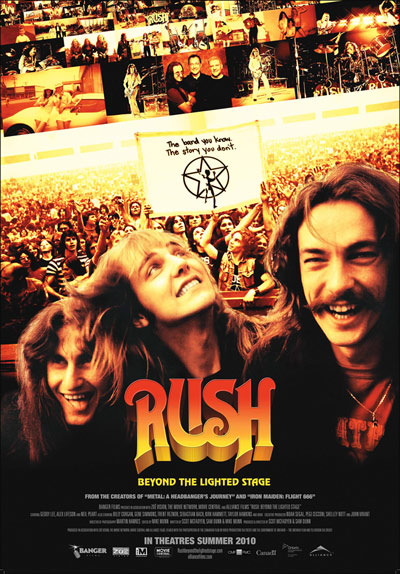
Beyond the Lighted Stage
Rounder
If you’ve been worried about coming out as a Rush fan, now is your moment. Not only does the band now rank among the top-grossing touring bands every time they hit the road, but you can also revel in the fact that the band’s sales place them third behind the Beatles and the Rolling Stones for the most consecutive gold or platinum studio albums by a rock band. If that’s not enough for you, feast your eyes on Sam Dunn and Scot McFayden’s new bio-flick about the Canadians rock group, Beyond the Lighted Stage, in which rockers as diverse as Gene Simmons, Billy Corgan, Sebastian Bach, Kirk Hammett and Trent Reznor show their stripes as true fans of the so-called holy trinity. It’s everything you wanted to know about Rush, but were afraid to be seen asking.
Alex Lifeson plays golf? Geddy collects baseballs? Neil Peart skipped out on the groupie scene because he wanted to read? This movie really is full of shocking secrets. Truly though, there’s a like to like and learn here, even as the film follows the patterns of most DVD-era rock docs. You get a walk through Alex and Geddy’s childhoods and the obligatory scene in which they visit their old high school together. There are plenty of old pics and an impressive amount of film of the band playing their really early music, some of which is pretty embarrassing even by Canadian rock standards. You witness their 1974 breakthrough, which was in large part thanks to WMMS in Cleveland. There’s a ton of interview footage, most of it very recent, including, surprisingly, plenty of time with all of the boys’ parents.
Among the real treasures on the disk are the clips of films shot by their families when Peart and Lee were still teenagers. There’s also a lot of great footage of the band playing their most difficult music, including an impressive film of “La Villa Strangiato,” which the band admits was even a little beyond them at the time. One thing you won’t see, at least not without digging into the special features, is anything to do with their 1987–93 period, a time so musically bleak for the band that not even these filmmakers dare to touch it.
The movie is smart in taking as its theme Rush’s terminal un-hipness, and positioning the band, as Geddy puts it, in the role of “the world’s most popular cult band.” There’s a section of the film about how terribly dressed they’ve always been, but it’s interesting to watch Geddy Lee finally evolve into the pretty cool looking middle-aged guy he is now. The theme of the artist against the mainstream is common-enough in their oeuvre, so it’s fitting that the band has embraced their career’s ultimate narrative.
Thus, the movie attempts to revise Rush’s place in rock history, repeatedly quoting people who consider them one of the greatest bands of all time. Whether or not you agree with this reassessment, you have to admit that Jack Black has a point when he says, “Rush has a deep reservoir of rocket sauce. Their bottle was large and they were shaking it for decades.”
Matt Slaybaugh
Here Comes Your Weekend Parking Lot Blowout Live Review
Tristan Perich, 1-Bit Symphony
Touch and Go: The Complete Hardcore Punk Zine '79-'83
A Live Evening with MGMT
The World Cup Top 10
Five Hundred 45s
Jello Biafra and the Guantanamo School of Medicine and Chrome Cranks Live Reviews
David Cross, Bigger and Blackerer
Rock 'n' Roll High School
Beach House Live Review
I Need That Record!
The Specials Live Review
The Antlers Live Review
Girls and the Wedding Present Live Reviews
